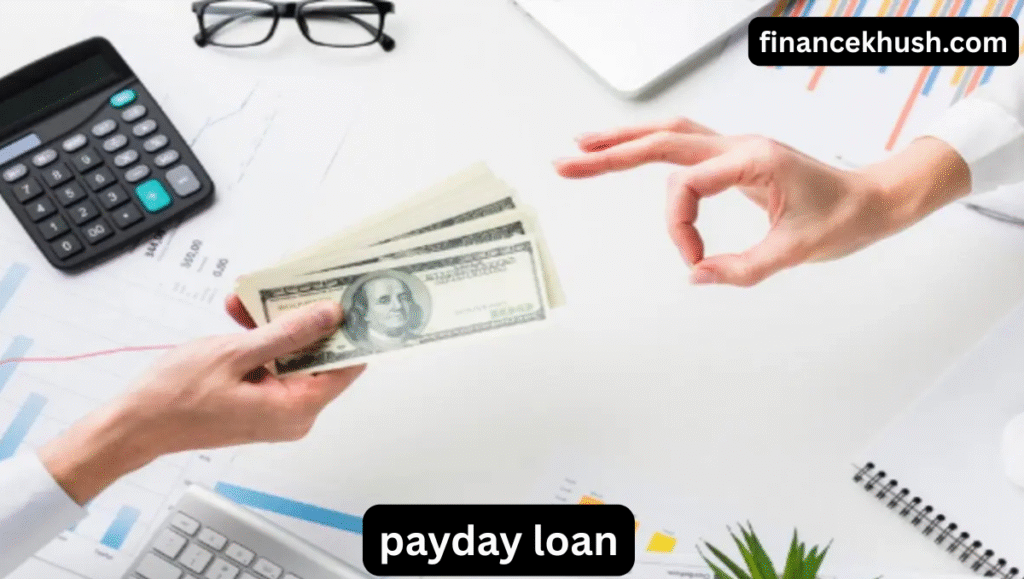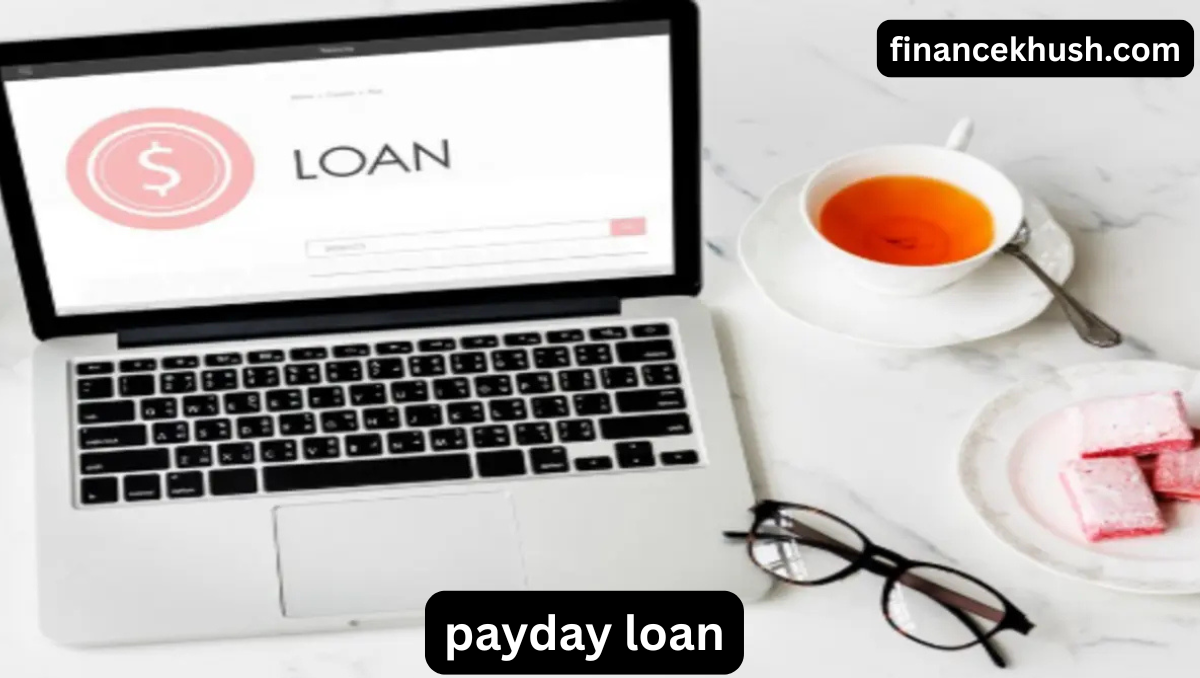payday loan is a short-term loan designed to help you cover urgent expenses when you’re low on cash. It’s quick and easy to access, typically available online or in-store, but it comes with high fees and interest rates. While it may seem like a quick fix, payday loans can be expensive and lead to a cycle of debt if not paid back on time. Borrowers are often required to repay the loan in full by their next payday, which can make it difficult to manage if you’re already struggling financially. Always explore other options before choosing a payday loan.
What Is a Payday Loan?
A payday loan is a type of short-term loan that’s typically meant to cover immediate expenses until you receive your next paycheck. These loans are usually for small amounts, and the repayment is often due within two weeks, or on the borrower’s next payday.
Payday loans are known for their fast approval process, making them popular among people who need quick cash. They often don’t require credit checks, which can be a major draw for people with poor credit histories or no credit at all.
However, while payday loans may seem like a convenient solution in a pinch, they come with significant downsides that need to be understood before borrowing.
How Do Payday Loans Work?
The process of getting a payday loan is relatively simple:
- Application: You can apply for a payday loan either online or in-person at a payday loan store. The application process generally requires basic personal information, proof of income (such as a pay stub), and a checking account where the loan funds can be deposited.
- Approval: Since payday lenders are mostly concerned with your ability to repay the loan when your next paycheck arrives, they typically won’t conduct a credit check. If you meet the basic requirements, such as having a steady income and a bank account, approval can be almost immediate.
- Receiving the Loan: Once approved, the lender deposits the loan amount directly into your bank account. Some lenders may even issue you a check or cash.
- Repayment: Payday loans are usually due on your next payday, which is typically two weeks after you take out the loan. The repayment includes the loan principal (the amount you borrowed) plus any interest and fees.
- Loan Renewal: If you can’t repay the loan on time, some payday lenders may offer you the option to roll over or renew the loan. However, this comes with additional fees, and the cycle of borrowing and repaying can quickly become expensive.
Key Features of Payday Loans
Before diving into the pros and cons, let’s quickly go over the key features of payday loans:
- Short-Term: Payday loans are designed to be paid back quickly, usually within two weeks, when you receive your paycheck.
- Small Loan Amounts: They are typically small loans, ranging from $100 to $1,000 (though the exact amount can vary).
- High Fees: Payday loans are notorious for having extremely high interest rates and fees, often much higher than traditional loans or credit cards.
- No Credit Check: Most payday lenders don’t check your credit score. They rely on proof of income and a bank account as assurance that you can repay the loan.
- Quick Access to Funds: One of the main draws of payday loans is their speed. You can often get approved and have cash in hand within a matter of hours.

Pros of Payday-Loans
While payday loans come with serious risks, there are some advantages that may make them a viable option in certain situations. Let’s break down the pros:
1. Fast and Convenient Access to Cash
One of the biggest advantages of payday loans is how quickly you can get the money you need. If you’re in a financial bind and need cash urgently, payday loans can provide immediate relief. The application process is often quick and straightforward, and you may have the money in your bank account in just a few hours.
2. No Credit Check Required
Traditional loans often require a credit check, which can be a barrier for individuals with poor or no credit history. With payday loans, your credit score isn’t a major factor in the approval process. Lenders are more focused on whether you have a steady income and a bank account where the funds can be deposited.
3. Available to People with Bad Credit
Because payday loans don’t rely on credit checks, they are a viable option for people with bad credit or no credit at all. For those who are unable to secure traditional loans, payday loans can provide a short-term solution.
4. Easy to Understand Terms
Unlike some financial products that are filled with jargon, payday loans are relatively simple to understand. You borrow a specific amount and agree to repay it by a certain date. The lender provides you with clear details about the amount to be repaid, as well as any fees associated with the loan.
5. No Collateral Required
Unlike secured loans, payday loans don’t require collateral. You don’t have to risk your home, car, or other valuables to get approved. This makes payday loans less risky for the borrower in terms of losing personal property.
Cons of Payday Loans
While payday loans can seem like a good option in an emergency, they come with significant risks that shouldn’t be ignored. Let’s go over the potential downsides:
1. High Interest Rates and Fees
Payday loans are notorious for their high interest rates. In some cases, the APR (annual percentage rate) can be as high as 400% or more. To put it in perspective, a typical credit card APR is around 20-30%. The high fees associated with payday loans can make them an incredibly expensive form of borrowing.
For example, if you borrow $100 and have to pay $15 in fees, that’s a 15% fee. However, since payday loans are typically due in two weeks, the APR can be much higher when calculated on an annual basis.
2. Short Repayment Period
One of the main drawbacks of payday loans is the short repayment period. The loan is typically due in two weeks, which may be difficult for some people to repay, especially if they are already living paycheck to paycheck. If you miss the payment, you could face additional fees or penalties.
3. Risk of Debt Cycles
Because payday loans are so short-term and expensive, borrowers often find themselves unable to repay the loan on time. This can lead to a cycle of borrowing, paying fees, and re-borrowing. With high fees and interest, the loan balance can quickly grow out of control, making it even harder to pay off. This is known as the “debt trap,” and it’s a significant risk for payday loan users.
4. Potential for Scams and Predatory Lending
Not all payday lenders are reputable. Some companies may engage in predatory lending practices, charging excessive fees or using aggressive tactics to collect payments. It’s important to carefully research payday lenders before borrowing money and to ensure that they are licensed and regulated by your local government.
5. Limited Loan Amounts
While payday-loans can help cover small expenses, they are not a good option for larger financial needs. The loan amounts are typically limited to a few hundred dollars, which might not be enough to cover significant expenses.
6. Can Hurt Your Credit Score
Though payday-loans themselves don’t require a credit check, failing to repay them on time can harm your credit score. If you fail to repay the loan, it could be sent to collections, which will negatively impact your credit.
Alternatives to Payday-Loans
If you’re considering a payday-loan, it’s essential to explore all your options. Here are some alternatives that may be less risky:
1. Credit Cards
If you have a credit card with available credit, using it for emergencies may be a better option. Credit cards often have lower interest rates than payday loans, and some even offer promotional 0% APR for a limited time.
2. Personal Loans
Personal loans from banks, credit unions, or online lenders typically have lower interest rates than payday loans. These loans may require a credit check, but they usually offer more favorable terms.
3. Borrow from Family or Friends
If possible, consider borrowing money from family or friends. While this can be awkward, it might be a better solution than falling into a payday loan cycle. Just make sure to agree on clear terms to avoid misunderstandings.
4. Payment Extensions or Plans
If you’re facing financial hardship, talk to your creditors or service providers. Some companies may be willing to extend your payment deadline or work out a payment plan that’s more manageable.

Conclusion
Payday loans can be an appealing solution when you need quick cash, but they come with high risks. While they may help in an emergency, the high interest rates, short repayment terms, and potential for debt traps make them a risky financial tool. Before turning to payday loans, it’s important to carefully assess your options and consider alternatives like personal loans, credit cards, or borrowing from family and friends.
related post
Faq’s
1. What is a payday loan and how does it work?
A payday loan is a short-term loan that provides quick cash to cover immediate expenses. It’s typically due on your next payday, and the loan amount is often based on your income. However, it comes with high fees and interest rates, which can make repayment challenging if not handled carefully.
2. Are payday loans safe to use?
While payday loans are legal and available, they can be risky. The high interest rates and fees can lead to a cycle of debt if not paid back on time. Always read the terms carefully and consider other options before borrowing.
3. What happens if I can’t repay my payday loan on time?
Failing to repay your payday loan on time can result in additional fees, extended interest, and potential damage to your credit score. Some lenders may offer extensions or rollovers, but they usually come with extra charges, making the loan even more expensive.
4. How much can I borrow with a payday-loan?
The amount you can borrow depends on your income and the laws in your state. Typically, payday-loans range from $100 to $1,000, but they vary widely by lender. You’ll usually need to prove a steady income to qualify.
5. Can payday-loans impact my credit score?
In most cases, payday lenders don’t report to credit bureaus, so your credit score won’t be directly affected by the loan itself. However, failure to repay or defaulting could lead to collections, which will hurt your credit.
6. Are there alternatives to payday-loans?
Yes, there are several alternatives. You can explore options like personal loans from banks, credit unions, or peer-to-peer lending platforms. Some employers offer payday advances, or you might consider budgeting strategies or negotiating bills to avoid the need for quick loans.

1 thought on “Payday Loan Pitfalls: Fast Cash at a Price in 2025”